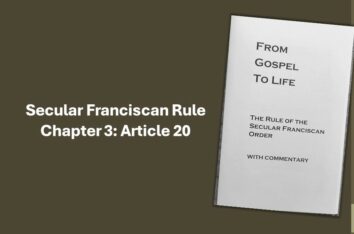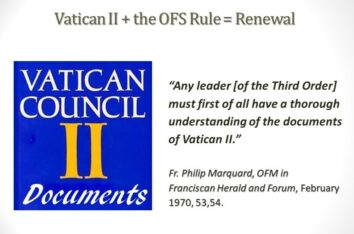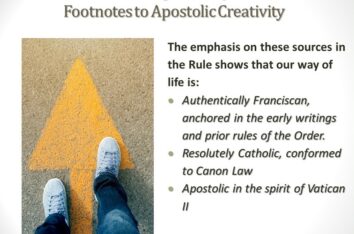+++++++++++++++++++++++++++++++++++++++++++++++++++++++++++++++++++++++++++++++++++++++++++++++++++
As we approach the Transitus and Feast Day of our Seraphic Father, we offer his own words as they appear in the Canticle of the Creatures. Composed in 1225 during his last illness, St. Francis gives glory to God through all of creation in the first portion of the canticle. Ever the peacemaker, he added verses 10 and 11 at a time when the political and religious authorities of Assisi conflicted. Then, right before his death, he added two verses praising God for “Sister Bodily Death,” and, as always, calling us to penance and conversion.
The Canticle of the Creatures
1 Most High, all-powerful, good Lord,
Yours are the praises, the glory, and the honor, and all blessing, Rv 4:9 Rv 4:11
2. To You alone, Most High, do they belong,
and no human is worthy to mention Your name..d
3 Praised be You, my Lord, with all Your creatures, Tb 8:7
especially Sir Brother Sun,
Who is the day and through whom You give us light.e
4 And he is beautiful and radiant with great splendor;
and bears a likeness of You, Most High One.
5 Praised be You, my Lord, through Sister Moon and the stars, Ps 148:3
in heaven, You formed them clear and precious and beautiful. a
6 Praised be You, my Lord, through Brother Wind,
and through the air, cloudy and serene, and every kind of weather,
through whom You give sustenance to Your creatures.
7 Praised be You, my Lord, through Sister Water, Ps 148:4 Ps 148:5
who is very useful and humble and precious and chaste.
8 Praised be You, my Lord, through Brother Fire, Dn 3:66
through whom You light the night, Ps 78:14 [Vulgate, Ps 77:14]
and he is beautiful and playful and robust and strong.
9 Praised be You, my Lord, through our Sister Mother Earth, Dn 3:74
who sustains and governs us,
and who produces various fruit with colored flowers and herbs. Ps 104:13 [Vulgate, Ps 103:13] Ps 104:14 [Vulgate, Ps 103:14]
10 Praised be You, my Lord, through those who give pardon for Your
and bear infirmity and tribulation.b
11 Blessed are those who endure in peace
for by You, Most High, shall they be crowned.
12 Praised be You, my Lord, through our Sister Bodily Death,
from whom no one living can escape.c
13 Woe to those who die in mortal sin.
Blessed are those whom death will find in Your most holy will,
for the second death Rv 2:11 Rv 20:6 shall do them no harm.d
14 Praise and bless my Lord Dn 3:85 and give Him thanks
and serve Him with great humility.
After reading the Canticle, go back and look at the Scripture sources indicated by the footnotes—read the passages—see how Francis was influenced by his intimate knowledge of Scripture.
+What part does Scripture play in your daily life? What does “going from Gospel to life and life to the Gospel” (Article 4 of our Rule) mean to you?
Reread verses 10 and 11 of the Canticle.
+How do you serve as a peacemaker in your family, job, or community?
+In what ways is it difficult for you to “forgive” those who don’t agree with you?
+Verse 10 calls to mind the story of Perfect Joy. What is Francis telling us in that story and in this canticle?
Verses 12 and 13 talks about the end of life and how we are to prepare.
+Give some thought to the qualities, it takes to accept our eventual death or the death of someone we love.
+Reread the Prologue to the Rule of 1978, especially “Concerning Those Who Do Not Do Penance.” Why are penance and conversion so important to us?
Here is a short video about the Transitus of St. Francis celebrated on October 3rd.
Por favor compartir con sus fraternidades locales
A medida que nos acercamos al Tránsito y la Fiesta de nuestro Seráfico Padre, ofrecemos sus propias palabras tal como aparecen en el Cántico de las Criaturas. Compuesto en 1225 durante su última enfermedad, San Francisco da gloria a Dios a través de toda la creación en la primera parte del cántico. Siempre pacificador, agregó los versículos 10 y 11 en un momento en que las autoridades políticas y religiosas de Asís estaban en conflicto. Luego, justo antes de su muerte, añadió dos versos alabando a Dios por la “Hermana Muerte Corporal” y, como siempre, llamándonos a la penitencia y la conversión.
ALABANZAS DE LAS CRIATURAS
1Altísimo, omnipotente, buen Señor,
tuyas son las alabanzas, la gloria y el honor y toda bendición.
2A ti solo, Altísimo, corresponden,
y ningún hombre es digno de hacer de ti mención.
3Loado seas, mi Señor, con todas tus criaturas,
especialmente el señor hermano sol,
el cual es día, y por el cual nos alumbras.
4Y él es bello y radiante con gran esplendor,
de ti, Altísimo, lleva significación.
5Loado seas, mi Señor, por la hermana luna y las estrellas,
en el cielo las has formado luminosas y preciosas y bellas.
6Loado seas, mi Señor, por el hermano viento,
y por el aire y el nublado y el sereno y todo tiempo,
por el cual a tus criaturas das sustento.
7Loado seas, mi Señor, por la hermana agua,
la cual es muy útil y humilde y preciosa y casta.
8Loado seas, mi Señor, por el hermano fuego,
por el cual alumbras la noche,
y él es bello y alegre y robusto y fuerte.
9Loado seas, mi Señor, por nuestra hermana la madre tierra,
la cual nos sustenta y gobierna,
y produce diversos frutos con coloridas flores y hierba.
10Loado seas, mi Señor, por aquellos que perdonan por tu amor,
y soportan enfermedad y tribulación.
11Bienaventurados aquellos que las soporten en paz,
porque por ti, Altísimo, coronados serán.
12Loado seas, mi Señor, por nuestra hermana la muerte corporal,
de la cual ningún hombre viviente puede escapar.
13¡Ay de aquellos que mueran en pecado mortal!:
bienaventurados aquellos a quienes encuentre en tu santísima voluntad,
porque la muerte segunda no les hará mal.
14Load y bendecid a mi Señor,
y dadle gracias y servidle con gran humildad.
Después de leer el Cántico, regrese y mire las fuentes de las Escrituras indicadas por las notas al pie de página, lea los pasajes y vea cómo Francisco fue influenciado por su conocimiento íntimo de las Escrituras.
+ ¿Qué papel juegan las Escrituras en su vida diaria? ¿Qué significa para usted “ir del Evangelio a la vida y de la vida al Evangelio” (artículo 4 de nuestra Regla)?
Releer los versículos 10 y 11 del Cántico.
+ ¿Cómo se desempeña como pacificador en su familia, trabajo o comunidad?
+ ¿De qué manera te resulta difícil “perdonar” a los que no están de acuerdo contigo?
+ El versículo 10 recuerda la historia de Perfect Joy. ¿Qué nos dice Francisco en esa historia y en este cántico?
Los versículos 12 y 13 hablan sobre el final de la vida y cómo debemos prepararnos.
+ Piense un poco en las cualidades que se necesitan para aceptar nuestra eventual muerte o la muerte de alguien a quien amamos.
+ Releer el Prólogo de la Regla de 1978, en especial “Sobre los que no hacen penitencia”. ¿Por qué son tan importantes para nosotros la penitencia y la conversión?
Un breve video sobre la vida de San Francisco en español


